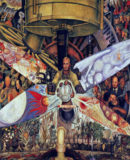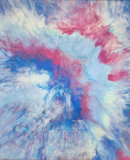OUR CULTURE…OUR BRAND?
OUR CULTURE…OUR BRAND?
It happens automatically. As soon as we start interacting with the world, we’re inducted into the Hall of Names and branded.
We become Brands.
Some will make a heated response: “Excuse me! I am not a Brand—I have a Brand. Maybe you don’t know the difference!”
Do those rejoinders point out a subtle difference? What is the difference? Because if we have a Brand that we pitch and associate with our Self, aren’t we pitching Ourselves?
As we hype our Self on Facebook, Twitter, LinkedIn, etc., in order to get attention for what we have and do–for what we ARE–suddenly that Brand has US.
But this is the point where it becomes necessary to consider how specious, how phony that claim really is. Because whatever brand we put out about ourselves, it can never encompass us, never describe what we really are.
Besides showing off the products we’re selling, or the talents we’re highlighting, does the brand signal our reactions? Can it provide a clue, for instance, about the kind of personal visions we prize, how kind and selfless we are; or if we lust after strange, exotic fruit, crave kinky moments, delirious activities; and whether we hoard money or spend wantonly?
Even if we identify with our product, is the product our identity—our culture?…Does my brand turn me into a commodity? Is the culture that surrounds me a reflection of what I commodify?
–Each time we sell something of ourselves, maybe we skim a little something off our psyche, letting it evaporate like water as we boil it down, reducing the prime part of our vitality.
If this be our life’s goal, our manifest destiny, it means we are selling ourselves both on the outside but also from inside ourselves as a particular, singular Brand. At the same time those clients who “like” us are also marketing themselves to us.
And however great a range of “likes” and clients we muster for our product, we narrow the focus of who we are.
This is inevitable because we tether ourselves to the acceptability, the like-ability of our brand.
It becomes addictive.—And just as an addict has many more layers of Life and Being that he can’t use because he’s tied to his addiction, so we too start to atrophy away from the many turns and tacks that animate our Being.
Then we no longer live at the center of our being; we stop being whole and integrated. We become the by-product of our brand.
And our surrounding culture is flattened by our self-diminishment.
Yet we’re not one-dimensional!
Before we burn our souls with branding irons that show who owns us; before our minds stamp in a catchphrase like one that’s gleamed at us for nearly 70 years–“A Diamond is Forever”; before we think ourselves pink as Owens-Corning’s fiberglass and swell with the epic assurance of Reebok affirming “I Am What I Am,” we can still pull away from the names, logos, slogans that zap our brains and egos.
We can tune to the frequencies in the variety of thought, sense, action we have stored up in our gut and mind. We can free our cells and neurons to boost our native vigor.
Then like the people in Plato’s Cave–who suddenly see the light, or those whose souls have withered into a single dogma and suddenly see a wealth of views, a wide spectrum of possibilities–we break away from the bonds that brand.
–And are reborn into prisms that burnish our potential and our culture, giving zest and wonder to our world.
Biography: Mara Lemanis has been a teacher and scholar of literature and film at Stanford, Yale, and the Jagiellonian University in Kraków; her essays have been selected for 20th CENTURY LITERARY CRITICISM and are included in undergraduate student textbooks in the U.S.
During her work as an archivist for Historical Preservation she investigated and nominated multiple sites in the Dakotas to the National Register of Historic Places. Among her most interesting studies were those of the Oglala Sioux at Pine Ridge and Wounded Knee where on December 29, 1890 the U.S. cavalry massacred members of the Lakota Nation.
In the course of her work she also took part in the communal spirit of the purification ceremony at a number of Lakota Sweat Lodges.
Recently she has worked with the IRC to assist refugees in Oakland, California.
Her father, Osvalds J. Lemanis, was an internationally renowned Latvian choreographer (The Royal Order of Vasa-Gustav V).
She also writes for the Diplomat Magazine in The Hague.
Disclaimer: The views, opinions and positions expressed within this guest article are those of the author Mara Lemanis alone and do not represent those of the Marbella Marbella website. The accuracy, completeness and validity of any statements made within this article are not guaranteed. We accept no liability for any errors, omissions or representations. The copyright of this content belongs to Mara Lemanis and any liability with regards to infringement of intellectual property rights remains with the author.






























